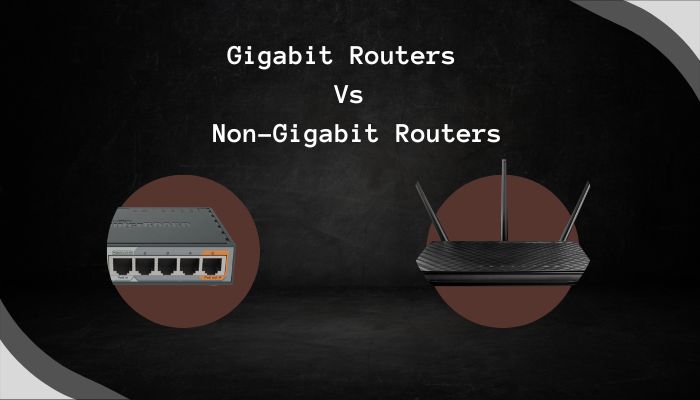A gigabit router is a type of networking device that is designed to support high-speed data transfer rates. It is a crucial tool for businesses and households that need a quick and dependable internet connection because it enables the smooth transmission of large amounts of data across a network.
Gigabit Ethernet connections, which offer data transfer rates of up to 1 Gbps, are commonly supported by the network interface of gigabit routers.
This is significantly faster than recent router models, which only support 10/100 Ethernet connections. With a gigabit router, users can benefit from faster internet speeds, smoother streaming, and quicker file transfers.

In this blog, we’ll understand what Is a Gigabit Router and explore the features and benefits of a gigabit router in more detail.
Do I Need A Gigabit Router?
A router type known as a gigabit router can manage data rates of up to one gigabit per second. These routers are typically used in networks with many connected devices and simultaneous large data transfers.
- The type of online activities you engage in and your internet service provider (ISP) will determine whether or not you need a gigabit router. A gigabit router won’t help much if your internet connection is slow because the maximum speed of your connection is already lower than what the router can handle.
- A gigabit router can significantly improve your online experience if your internet connection is 100 Mbps or faster. You can get faster download and upload speeds, lessen lag and buffering while streaming video or playing games, and support more devices without experiencing any performance hits.
- You should also consider the number of devices connected to your network. A gigabit router can help ensure that all your devices, including smart home appliances, laptops, tablets, and smartphones, can function at their best speeds.
In conclusion, if you have a fast internet connection and multiple devices connected to your
network, investing in a gigabit router can be a wise choice. However, a standard router may suffice if you have a slow internet connection or only a few devices.
Aspect | 100Mbps (Fast Ethernet) Router | 1Gbps Router |
Maximum Speed | 100Mbps | 1Gbps |
Network Size | Small to Medium Sized Networks | Medium to Large Networks |
Cost | Inexpensive | More Expensive |
Latency | Higher Latency | Lower Latency |
Future-proofing | Limited Scalability | More Scalable |
- Maximum Speed: The maximum speed that a 100Mbps (Fast Ethernet) router and a 1Gbps router can support is the main distinction between them. A 1Gbps router can handle up to 1Gbps, whereas a Fast Ethernet router can handle up to 100Mbps.
- Network Size: Another important distinction is the network size for which the router is appropriate. Small- to medium-sized networks can use a Fast Ethernet router, while larger networks benefit more from a 1Gbps router.
- Cost: One more important aspect that distinguishes the two routers is price. A Fast Ethernet router costs less than a 1Gbps router, which costs more.
- Latency: Compared to a 1Gbps router, a Fast Ethernet router typically has a higher latency. As a result, data transfers between network-connected devices take longer to complete.
- Future-proofing: A 1Gbps router is, at last, more resilient to change than a Fast Ethernet router. A 1Gbps router is more scalable and can handle higher data traffic as more and more devices demand faster network speeds, in contrast to a Fast Ethernet router’s limited scalability.
Will Buying A Gigabit Router Give My Network Gigabit Speeds?
Purchasing a gigabit router does not ensure your network will operate at gigabit speeds. Your internet connection speed, the quality of your Ethernet cables, and the capabilities of the devices connected to your network are just a few of the variables that can affect the actual speed you experience on your network.
- First, the maximum speed you can achieve on your network depends greatly on your internet connection speed. If your internet service provider (ISP) only offers speeds of 100Mbps, for example, even if you have a gigabit router, you cannot achieve gigabit speeds on your network.
- Second, the caliber of your Ethernet cables may also affect how quickly your network operates. Slower speeds could result from cables that are too old or damaged to support your gigabit router’s full speed.
- Lastly, the capabilities of the devices connected to your network can also impact the speed that you experience. If your devices only have Fast Ethernet (100Mbps) network adapters, for example, even if you have a gigabit router, you cannot achieve gigabit speeds on those devices.
In conclusion, investing in a gigabit router is wise if you have high-speed internet and high-performance hardware. Still, it does not ensure your network will operate at gigabit speeds. The speed of your network is also greatly influenced by other elements, including Ethernet cables, device capabilities, and internet connection.
When Do You NOT Need A Gigabit Router?
Here are some situations where you may not need a gigabit router:
- Slow Internet Connection: A gigabit router won’t significantly speed up your network if your internet connection is slow. A standard router that supports lower speeds may be sufficient in such cases.
- Fewer Devices: You might not need a gigabit router if your network is small and only has a few devices. A typical router might handle the meager traffic on your network.
- Older Devices: Upgrading to a gigabit router won’t help if your devices can only support slower network speeds. A standard router that supports lower speeds may be sufficient in such cases.
- Budget constraints: Compared to a gigabit router, a standard router that supports slower speeds may be a more cost-effective option.
You might not require a gigabit router if your internet connection is slow, you only have a few devices, your devices are old and incapable of supporting higher speeds, or your budget is tight.
Gigabit Routers Vs Non-Gigabit Routers:

Gigabit routers and non-gigabit routers can be compared in the following ways:
- Speed: Speed is the main distinction between gigabit routers and non-gigabit routers’ support. Non-gigabit routers typically only support speeds up to 100Mbps, whereas gigabit routers can support data rates up to 1Gbps.
- Network Size: While non-gigabit routers are better suited for smaller networks with fewer devices, gigabit routers are typically designed for medium to large networks with numerous devices.
- Cost: Gigabit routers are generally more expensive than non-gigabit routers due to their higher speed capabilities.
- Latency: Because gigabit routers typically have lower latency than non-gigabit routers, data transfer between devices on the network is quicker and more effective.
- Future-proofing: Gigabit routers are more future-proof than non-gigabit routers, as they can support higher speeds and are better equipped to handle the increasing demands of modern networks.
What Are The Benefits Of A Gigabit Router?

Gigabit router advantages include the following:
- Increased Speed: Gigabit routers can operate at up to 1Gbps, which is ten times faster than conventional routers. This enables quicker streaming, uploading, and downloading and a more seamless online experience.
- Improved Performance: Data transfer between devices on the network is faster and more effective thanks to gigabit routers’ lower latency than non-gigabit routers. As a result, online gaming, video calls, and other network-demanding activities may run more smoothly and with less lag.
- Better Network Capacity: Compared to non-gigabit routers, gigabit routers are built to support more devices and higher network traffic. They are, therefore, perfect for bigger networks that need high-speed internet access for numerous devices.
- Future-Proofing: Because gigabit routers can support faster speeds and are better equipped to handle the rising demands of modern networks, they are more future-proof than non-gigabit routers.
- More Advanced Security Features: Gigabit routers frequently include more sophisticated security features like firewall protection and VPN support, which can help shield your network from online dangers.
Gigabit routers are a wise investment for those requiring high-speed internet because they provide greater speed, improved performance, better network capacity, future-proofing, and more security features than non-gigabit routers.
Frequently Asked Questions:
Fiber and Gigabit are not directly comparable because they refer to different aspects of a network. Fiber refers to the cable transmitting data, while Gigabit refers to the maximum data transfer rate a router can support.
Fiber optic cables can support higher data transfer rates than traditional copper cables, making them better for high-bandwidth applications like video streaming and online gaming. However, a fiber connection alone does not guarantee faster internet speeds.
To determine if your router is a Gigabit router, you can check the specifications or documentation that came with the device. Look for the term “Gigabit” or “10/100/1000” in the product name or description.
Alternatively, you can check the network ports on the back of the router. Gigabit routers typically have one or more Ethernet ports labeled as “10/100/1000” or “Gigabit.” If your router has only “10/100” ports, it is not a Gigabit router and can support a maximum data transfer rate of 100 megabits per second.
Conclusion:
A Gigabit router is a kind of network router that can accommodate data transfer rates of up to 1 Gigabit per second. It is designed to provide fast and reliable internet connectivity for devices in a home or office network.
With a Gigabit router, users can benefit from high-speed internet access for streaming, gaming, and downloading large files. Anyone who requires a quick and reliable internet connection needs this device. By now, it is clear to you what is a Gigabit router.

I am a Chandan Tewatia and I am the founder of this blog cfindia.net. I have been in the industry for over 10 years and have worked with some of the biggest names in the business. I have a wealth of experience and knowledge to share, and my blog is a platform for me to do just that.
